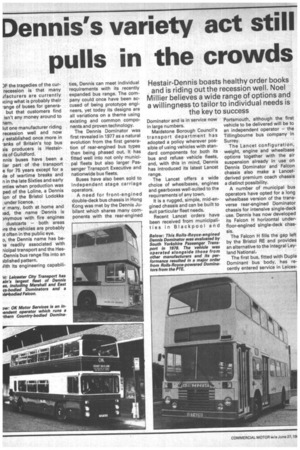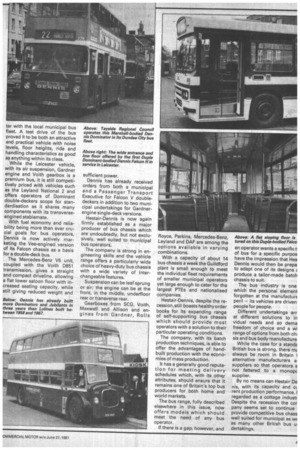Dennis's variety act still pulls in the crowds
Page 48

Page 49

If you've noticed an error in this article please click here to report it so we can fix it.
Hestair-Dennis boasts healthy order books and is riding out the recession well. Noel Millier believes a wide range of options and a willingness to tailor to individual needs is the key to success
JF the tragedies of the currecession is that many ifacturers are currently icing what is probably their ange of buses for generabut that customers find isn't any money around to nem.
lut one manufacturer riding recession well and now
established once more in -anks of Britain's top bus 3is producers is Hestairtis of Guildford.
nnis buses have been a liar part of the transport e for 75 years except for a Ile of wartime breaks and n in the late Sixties and early :Mies when production was ped of the Loline, a Dennis ion of the Bristol Lodokka : under licence.
ir many, both at home and )ad, the name Dennis is )nymous with fire engines dustcarts — both areas ire the vehicles are probably A often in the public eye.
o, the Dennis name has bele readily associated with nicipal transport and the Hes-Dennis bus range fits into an thlished pattern.
Jith its engineering capabili
ties, Dennis can meet individual requirements with its recently expanded bus range. The company could once have been accused of being prototype engineers, yet today its designs are all variations on a theme using existing and common components and proven technology.
The Dennis Dominator was first revealed in 1977 as a natural evolution from the first generation of rear-engined bus types then being phased out. It has fitted well into not only municipal fleets but also larger Passenger Transport Executive and nationwide bus fleets.
Buses have also been sold to independent stage carriage operators.
A need for front-engined double-deck bus chassis in Hong Kong was met by the Dennis Jubilant which shares many components with the rear-engined Dominator and is in service now in large numbers.
Maidstone Borough Council's transport department has adopted a policy wherever possible of using vehicles with standard components for both its bus and refuse vehicle fleets, and, with this in mind, Dennis has introduced its latest Lancet range.
The Lancet offers a wide choice of wheelbases, engines and gearboxes well-suited to the requirements of any town.
It is a rugged, simple, mid-engined chassis and can be built to suit particular fleet needs.
Recent Lancet orders have been received from municipalities in Blackpool and Portsmouth, although the first vehicle to be delivered will be to an independent operator — the Tillingbourne bus company in Surrey.
The Lancet configuration, weight, engine and wheelbase options together with the air suspension already in use on Dennis Dominator and Falcon chassis also make a Lancetderived premium coach chassis a distinct possibility.
A number of municipal bus operators have opted for a long wheelbase version of the transverse rear-engined Dominator chassis for intensive single-deck use. Dennis has now developed its Falcon H horizontal underfloor-engined single-deck chassis.
The Falcon H fills the gap left by the Bristol RE and provides an alternative to the integral Leyland National, The first bus, fitted with Duple Dominant bus body, has recently entered service in Leices ter with the local municipal bus fleet. A test drive of the bus proved it to be both an attractive and practical vehicle with noise levels, floor heights, ride and handling characteristics as good as anything within its class.
While the Leicester vehicle, with its air suspension, Gardner engine and Voith gearbox is a premium bus, it is still competitively priced with vehicles such as the Leyland National 2 and offers operators of Dominant double-deckers scope for standardisation as it shares many components with its transverseeng ined stablemate.
With fuel economy and reliability being more than ever crucial goals for bus operators, Dennis is now actively marketing the Vee-engined version of its Falcon chassis as a basis for a double-deck bus.
The Mercedes-Benz V6 unit, coupled with the Voith D851 transmission, gives a straight and compact driveline, allowing a flat lower saloon floor with increased seating capacity, while still giving reduced weight and sufficient power.
Dennis has already received orders from both a municipal and a Passenger Transport Executive for Falcon V doubledeckers in addition to two municipal undertakings for Gardnerengine single-deck versions.
Hestair-Dennis is now again firmly established as a major producer of bus chassis which are undoubtedly, but not exclusively, well suited to municipal bus operators.
The company is strong in engineering skills and the vehicle range offers a particularly wide choice of heavy-duty bus chassis with a wide variety of interchangeable features.
Suspension can be leaf sprung or air; the engine can be at the front, in the middle, underfloor rear or transverse rear.
Gearboxes from SCG, Voith, Maxwell and Allison and engines from Gardner, Rolls Royce, Perkins, Mercedes-Benz, Leyland and DAF are among the options available in varying combinations.
With a capacity of about 14 bus chassis a week the Guildford plant is small enough to meet the individual fleet requirements of smaller municipal operators yet large enough to cater for the largest PTEs and nationalised companies.
Hestair-Dennis, despite the recession,still boasts healthy order books for its expanding range of self-supporting bus chassis which should provide most operators with a solution to their particular operating conditions.
The company, with its batch production techniques, is able to offer the advantages of handbuilt production with the economies of mass production.
It has a generally good reputation for meeting delivery schedules which, with its other attributes, should ensure that it remains one of Britain's top bus producers for both home and world markets.
The bus range, fully described elsewhere in this issue, now offers models which should meet the need of any bus operator.
If there is a gap, however, and an operator wants a specific t of bus for a specific purpos have the impression that Hes Dennis would then be prepa to adapt one of its designs produce a tailor-made batch chassis to suit.
The bus industry is one which the personal element forgotten at the manufacturc peril — its vehicles are driven people for people.
Different undertakings arr at different solutions to in vidual needs and so dema freedom of choice and a wi range of options from both ch; sis and bus body manufacture
While the case for a sten& British bus is strong, there mi always be room in Britain I alternative manufacturers a suppliers so that operators a not fettered to a monopc supplier.
By no means can Hestair DE nis, with its capacity and ct rent production performance, regarded as a cottage indust Despite the recession the coi pany seems set to continue provide competitive bus chas: well suited for municipal as w as many other British bus dertakings.




















































































































